published at Goodreads
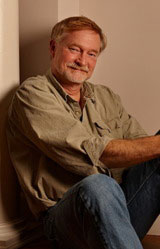 Author Erik Larson, a former journalist, subscribes to a brand of historical storytelling that cracks open what he calls "the little details that cause the narrative to get up and walk." This approach is on display in his many narrative nonfiction bestsellers: The Devil in the White City, Isaac's Storm, In the Garden of Beasts, and Thunderstruck. His forthcoming book about the sinking of the Lusitania, Dead Wake, is no exception. Timed to coincide with the 100th anniversary of the great maritime tragedy, it zeroes in on everything from President Woodrow Wilson's passionate love letters and need to golf in the days following the disaster to morgue photographs of those who perished, including one of a woman who, even in death, appears to be holding her breath. Typically Larson's narrative provokes more questions than it answers, chief among them how a German U-boat could sink the British luxury liner "Lucy"—a ship no one believed vulnerable to attack, although it had been warned against traveling in a war zone—killing 1,195 passengers and crew members.
Author Erik Larson, a former journalist, subscribes to a brand of historical storytelling that cracks open what he calls "the little details that cause the narrative to get up and walk." This approach is on display in his many narrative nonfiction bestsellers: The Devil in the White City, Isaac's Storm, In the Garden of Beasts, and Thunderstruck. His forthcoming book about the sinking of the Lusitania, Dead Wake, is no exception. Timed to coincide with the 100th anniversary of the great maritime tragedy, it zeroes in on everything from President Woodrow Wilson's passionate love letters and need to golf in the days following the disaster to morgue photographs of those who perished, including one of a woman who, even in death, appears to be holding her breath. Typically Larson's narrative provokes more questions than it answers, chief among them how a German U-boat could sink the British luxury liner "Lucy"—a ship no one believed vulnerable to attack, although it had been warned against traveling in a war zone—killing 1,195 passengers and crew members.
From his hotel room in Washington, D.C., where he had traveled to sign thousands of his books for his publisher, Larson spoke by phone with Goodreads Author Joy Horowitz about his extensive research practices, why his physician wife uses smiley faces and rows of zzzzz's in her line edits of his work, and how double-stuffed Oreos and monkey lamps are a critical part of his writing process.
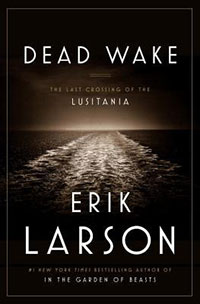 Goodreads: In your alternative biography about your time in college, you wrote, "I studied Russian, learned to drink vodka from a real Russian prince, fought acne by wearing underwear on my head to keep the hair off my face and graduated Summa Cum Laude." Can we talk about the underwear on your head part?
Goodreads: In your alternative biography about your time in college, you wrote, "I studied Russian, learned to drink vodka from a real Russian prince, fought acne by wearing underwear on my head to keep the hair off my face and graduated Summa Cum Laude." Can we talk about the underwear on your head part?
Erik Larson: When you have acne, which I did have pretty badly for the first two years I was in college, you've got to keep greasy hair off your forehead. And I just thought, Hey, what do I have that would work for that? Hey, I had underwear. And you know what? It worked. I did gain a certain reputation freshman year in my hallway.
GR: OK, that is one of the oddest things I've ever heard, but it's great to know.
EL: I'm a pragmatic guy. My favorite motto is from Teddy Roosevelt, who once said, "Do the best with what you got where you are." And so that was an example.
GR: Your author page mentions how that motto really annoys your children.
EL: Everything that I do annoys my children.
GR: You've said you're a paranoid flier. So I wonder how your book tour is going on that score.
EL: [chuckles] Well, you know that is the only aspect of book tours I find anxiety provoking. I think book tours would be great if you didn't have to fly. I'll go out of my way not to fly. If I can drive between cities within five hours away, I will drive—even though statistically I know it's far safer to fly. Unfortunately there's a lot of territory in the Midwest with those regional jets. I hate those.
GR: Is that why Airplane is your favorite comedy?
EL: No, it's just a very funny movie. It's in the family canon as one of the half dozen funny films we always quote to each other.
GR: What are the others?
EL: In addition to Airplane, there's Young Frankenstein, High Anxiety—another Mel Brooks classic. Sometimes Dracula: Dead and Loving It. Ghostbusters.
GR: Was there one particular moment or piece of research that got you going on Dead Wake?
EL: I have a supernatural element to my personality, I guess. But I always look for a sign. I look for a sign that I'm on the right track. I had done some preliminary research about the Lusitania but was not at all certain I wanted to do it. I had always been interested in the Lusitania. But it's not really my kind of thing. I like having ideas that are more complex because, frankly, then you can build barriers to entry. I'm more likely to have a competitor that might creep up [for the Lusitania topic].
But the thing that tipped the balance for me was, here was this big anniversary. I'm formerly a hard-core journalist. You always want a reason to do something now. So this anniversary was coming up, and maybe I could get this done in time. So I went down to the Hoover Institution at Stanford University, and they have a little archive there on the Lusitania. And I was sitting down, reading through various transcripts, when one of the archivists comes up to me with a stick. Actually it was a plank of wood. I didn't ask her about it. She just brought it to me and showed it to me. It was a plank of wood from the lifeboat of the Lusitania found on the beach beside a dead passenger. And it had been forwarded over time to various places and wound up at the Hoover Institution. And that was one of those moments where you literally get to touch the past. So I thought, Hey, I'm interested.
GR: You also had an opportunity to look at the morgue photos of the Lusitania. What did you learn from them?
EL: When I asked about the photographs at the Cunard Archive, which is now held at the University of Liverpool, they were very reluctant to let me see the photographs. It was only because, thankfully, one of the curators liked my books. So I was given access, not allowed to bring in my camera, which is fine.
So I sat down and looked at these things. It was very powerful. Here they were dead, photographed pretty soon after the disaster. Still wearing the clothes they had worn that day. In some cases they just looked impeccably dressed like, boom: one moment you're fine and the next you're not. What was important about the photographs, though, was that—and this is going to sound strange—I always like to have confirmation that something actually really happened. Of course we all know the Lusitania sank. What I mean is, it's more of a metaphysical sense that something happened. I really need to appreciate the stakes and impact. And there's nothing like looking at these photographs to make you realize the story of the Lusitania. It's not a geopolitical thing. Did it drive us to war or not? It's a human tragedy of immense magnitude.
GR: Your description of a photograph of a curly-headed three-year-old with a look "of pure fury" on her face, even in death, was overwhelming to me, in a way.
EL: Yeah, that was really surprising to me. I always assumed that people's faces kind of lapsed into whatever. And then the woman who really does look like she's holding her breath. It's kind of scary, really.
GR: You just took notes on these faces?
EL: That's the way I like to do it. Photographs are more, frankly, sources of archival information rather than conveyances for an image. When you look at a photograph, I'm always after the information conveyed from a period. In the case of the morgue photographs, the more you study them, the more they tell you about clothing, about grooming, about everything. They were really fascinating about the period but also the sheer horror of the disaster.
GR: And as you pointed out in the book, people unwittingly saved themselves by keeping their clothing on, which would allow them to not succumb to the cold of the water as quickly as others.
EL: Yeah, that was counterintuitive to me, until I started reading about hypothermia.
GR: Your portrayal of President Wilson was fascinating in terms of how preoccupied he seemed by the grief of losing his wife and then by his infatuation with his new girlfriend. He didn't even say anything about the sinking of the Lusitania until several days later, which would be unthinkable today.
EL: And he went golfing each day. I think Wilson had a real instinctive grasp of the country in terms of his immediate reaction to the Lusitania. I had come into this book with a perception of Wilson as a kind of stale, proper character, like the famous photo of the farmer and his wife—a stodgy, Waspy, uninteresting stiff. And then as I read about him, especially the letters he wrote to Edith Galt, I learned he was a man of great passion, but he was also a man who cared deeply about war and the consequences of war, which, frankly, given our current context, is refreshing. He understood something that the nation did not yet understand, and that is the true consequences of war. He understood that America was not ready for war; therefore his reaction to the Lusitania had to be very measured.
He went golfing because he wanted the nation to know that the whole world had not gone to hell. The world in America was very much the world that it was before the ship sank. He went golfing. He went driving. Interestingly, and what was a revelation to me, was that the country did not want war at the time. It's a misconception conjured in some high school history courses that the Lusitania was this trigger that immediately launched America into war. In fact, the immediate reaction was really in a direction that Wilson was taking: Let's not go nuts about this thing. Let's be measured. Let's be confident. So I came away with a better sense of Wilson. He was completely lost in love with Edith Galt.
GR: You've got to love him for that.
EL: Yeah. I was only able to convey a brief sample of the letters. They're just amazing. You can't believe that Wilson actually wrote them.
GR: There were some small details in the book that really did me in. For example, Nellie Huston's letter about "the size of her derrière" was ultimately found in a purse floating on the sea. How were they found and by whom?
EL: I have no idea. The letter was in the purse and subsequently confirmed by family members. I love that kind of thing. It's like from a narrative perspective, you know here was this charming letter. I really liked the letter. Even back then people were concerned with the size of their butts. But then when I realized that the letter had come from a purse floating on the sea, it really added a moment of narrative power.
GR: One of the most poignant parts of the book for me is the question it raises about the passengers ignoring the embassy's warning against travel in the war zone. Is it possible a warning like that wasn't really publicized at that time?
EL: No. It was in the shipping news, the major New York papers. In some cases it was right next to ads for the Lusitania. It's a valid question to ask how many people who were boarding the ship that morning were actually aware of the warning and of that specific morning's advertisement. However, everyone was aware before that that the Germans had declared the waters around Britain a war zone. So yes, there was specific warning of that day.
But I think the reason so many people went aboard is, nobody believed the ship could possibly be sunk. And if somebody did try to do it, it was too big and too fast to do it. Nobody believed anybody would try to do it. The rules of naval warfare were still very strict on the subject of civilian vessels. And if somebody did try, nobody thought a submarine could catch a ship, let alone keep them in sights long enough to launch a torpedo.
GR: Goodreads member Richard Wagaman asks, "I would like to know how your understanding of the Lusitania disaster might impact events today?"
EL: The message of the Lusitania is overconfidence breeds disaster. The example of that I use today is, we're all complacent about one thing we shouldn't be, and that's nuclear weapons. Everybody's got them. I just get this horrible feeling we're all too confident, nobody will try to use them deliberately or accidentally set them off. Therein lies the Lusitania effect: It can't happen. Therefore it won't.
I can tell you one thing, though. Being a paranoid flier, if I see an ad in the paper that morning saying my flight to London is going to be blown up, I would not get on that plane.
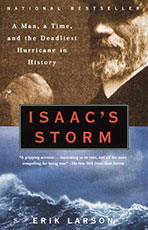
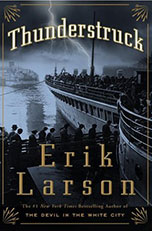 GR: Goodreads Author Debra Komar writes, "The ocean figures prominently in a number of your books. It is the threat looming over Isaac's Storm and a means of isolating characters and building tension in Thunderstruck. Now comes the story of the Lusitania, which leads me to wonder what is it about large bodies of water that fascinates you so. Do you live by the sea, or was there a traumatic event in your childhood or some long-standing water phobia that is driving all this?"
GR: Goodreads Author Debra Komar writes, "The ocean figures prominently in a number of your books. It is the threat looming over Isaac's Storm and a means of isolating characters and building tension in Thunderstruck. Now comes the story of the Lusitania, which leads me to wonder what is it about large bodies of water that fascinates you so. Do you live by the sea, or was there a traumatic event in your childhood or some long-standing water phobia that is driving all this?"
EL: That's such an interesting question. It is certainly not a deliberate thing. Maybe it's because I've got Scandinavian heritage, but I've always had this fascination with the ocean since I grew up on Long Island. I was at Jones Beach every chance I got in the summer and even in the winter—I love seacoasts. I love oceans. I cannot imagine living in a place where there's not a vast body of blue water. There was to my knowledge no traumatic event, just a longtime fascination with the sea and shipping. It's kind of an accidental thing.
GR: Goodreads member Stephanie Slavkin asks, "How do you select the historical events in which your stories are set? Your research is extensive. Is there a certain amount of information (or access) that you feel you have to have in order to choose a particular event? Have you ever thought about a story set around 9/11?"
EL: First of all, I never thought of writing anything about 9/11. I think there have been some wonderful books about 9/11, both fiction and nonfiction. I feel too close to it, really. But in terms of ideas, the whole process of choosing an idea is very complicated. One of the key factors is, there has to be a very rich and deep reservoir of archival material. I'm not just talking about secondary and tertiary materials, historic surveys, or books others have done. There has to be this really rich archival body of information. That's one of the things that drew me to the Lusitania. It held out possibility because archival resources are so rich on both sides of the Atlantic. There's so much depth there; it held out the possibility of writing a nonfiction work that's also suspenseful. I saw this as almost a Hitchcockian exercise in writing nonfiction history in using all these resources. That is really, really important. But the selection of the idea, I wish I knew. I start with a blank slate every time, and eventually something does come to me. I do try to put myself in the way of reading broadly. Reading obituaries. Occasionally I'll see a reference in a novel and think, I didn't know about that.
GR: Goodreads Author Jane Greensmith says: "While I really enjoy your work and trust that your narrative is based on rigorous research, I'm becoming disenchanted with the genre because it seems many writers have crossed the line, writing fictionalized stories and not narrative nonfiction. How do you personally guard against letting your imagination take over when the historical record doesn't tell you everything you want to know in order to tell the story you've set out to tell?"
EL: That is a terrific question. I don't like labels. Some people like calling it narrative nonfiction or immersion journalism. The key is, you have to go the distance. You cannot take shortcuts. Some writers get the sense there's cachet to writing narrative nonfiction. There is a tendency to choose ideas that are difficult, where somebody says, "I'll be forgiven for trying to imagine conversations." You do that and you cross the line into fiction.
The key is, you go the distance and spend far more time than any rational human being would in archives and libraries. Even when you think you've got everything, you go beyond and just keep looking until you find it. The key is the itty-bitty details that somehow light the imagination. You've got to find the little details that cause the narrative to get up and walk. It's the reader who does that. Not me. It's the reader who connects the dots as a very fluid, living event.
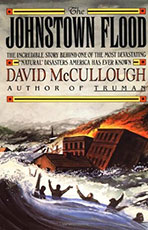 GR: Which authors or books most influenced your writing?
GR: Which authors or books most influenced your writing?
EL: I'm really into the prose, the storytelling. The writers who have been a big influence on me have been Hemingway, Fitzgerald, Steinbeck. Dashiell Hammett. Chandler. In terms of prose, I love the clarity and cleanliness of their prose. In terms of writing, those are my guys. What made me think there was another more compelling way to write history, I owe that to David McCullough and his book The Johnstown Flood. I read that and thought, "Oh, wow, it's all true and has all these elements."
GR: Who are you reading now?
EL: Oh boy. Who am I not reading now? I'm loving Annie Lamott's newest collection of essays, Small Victories. I just finished reading Gone Girl. I just finished reading Station Eleven, which I loved. I'm five pages into Life After Life by Kate Atkinson.
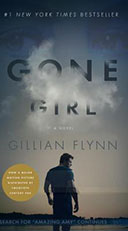
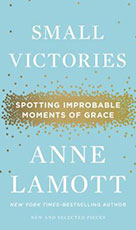 GR: Could you talk about your writing process in terms of rituals or habits?
GR: Could you talk about your writing process in terms of rituals or habits?
EL: We moved to New York in October, and I just got two monkey lamps for my office that I love. It's a genre of lamps from a certain era. They have monkeys on the shaft of the lampshade. I've got a real soft spot for monkey lamps. They speak to me of a time of cargo ships and fog, when there was a fascination with far-off realms. Something very noir-ish and Bogarty about them. 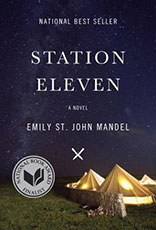
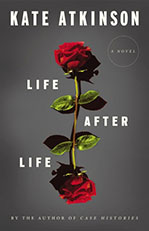 My ritual is every morning. I make coffee and—this is sort of a superstitious thing—I have to have an Oreo cookie, double stuffed. So it's me and my Oreos. On a good day it's just one. On a bad day it's two.
My ritual is every morning. I make coffee and—this is sort of a superstitious thing—I have to have an Oreo cookie, double stuffed. So it's me and my Oreos. On a good day it's just one. On a bad day it's two.
GR: Whoa. You can stop at two?
EL: I have to stop at
two.
GR: That is impressive.
EL: I'll work until breakfast time.
GR: You mention in the book's acknowledgments that your wife is an important first reader who offers long rows of zzzzz's as well as smiley faces. Is she your most important reader?
EL: Yeah, no question.
GR: So are you writing to her?
EL: No. I'm not writing to her. That's a very interesting question. I don't know who I'm writing to. I'm writing to me, I think. I'm writing the kind of thing that I think I would want to read. My wife is a terrific natural editor. She's an academic physician, very senior in her field. But she loves to read and has a good sense of narrative pace. It took us a while to discover this. It's a very confrontational thing, when you sit down and your wife tells you bad things about your book. So that's how this whole thing with symbols in the margin came about. It's much less confrontational.
GR: So it's like a self-protective thing for you.
EL: Oh very much. It's like a self-preservation thing.
published at Goodreads